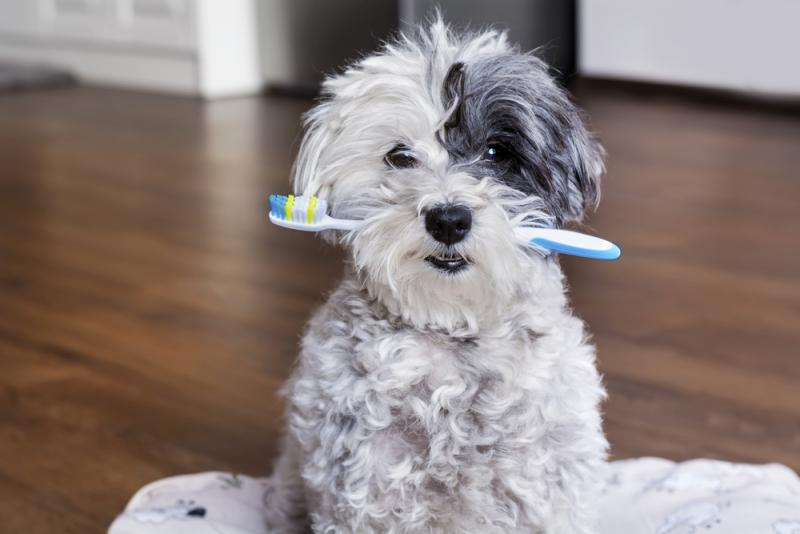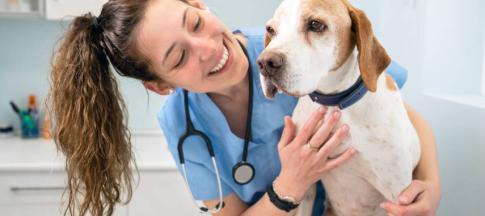
Keeping your pet’s teeth clean and healthy benefits everyone. Not only can it help reduce the risk of, or even prevent certain dental diseases, but it can also save you money in the long run.
Just like humans, dental care for pets can be expensive. But having pet insurance in place can help with different vet fees for dental problems, depending on your limits and level of cover.
Read on to find out how to keep your pet’s teeth healthy and why it's useful to have pet dental cover in place.
Why does my pet need dental cover?
There are different dental problems your pet could have, like broken teeth or gum disease.
Your pet could end up in the vets if they:
- chip or break their teeth from putting something sharp or blunt in their mouth, like biting or chewing stones
- develop gum disease because of a build-up of plaque and tartar. If left untreated, it can cause infections or tooth loss
- have a bad tooth infection that can get into the blood and spread elsewhere, like into their heart or kidneys
If your pet ends up at the vets with a mouth injury, it’s reassuring to know that their treatment is covered by pet insurance (depending on your policy’s limits and exclusions).
How much do dental treatments cost?
Vet fees aren’t standardised in the UK. This means that treatment costs vary between vet practices and the type of work needed.
For example, a scale and polish could cost less than a complicated tooth extraction.
The cost of dental treatment also depends on your pet’s:
- size
- age
- health status
It's not just the dental work that costs money. Extra services and aftercare, like X-Rays, anaesthetics and painkillers, cost money too.
Does my pet insurance cover dental care?
Not all pet insurance policies include dental cover, so check your policy book as some insurers might not include dental treatment.
At Admiral, we cover the cost of dentistry if your pet has an accident or injury involving their teeth or gums. For example, if your pet broke a tooth from chewing stones, we would cover you, depending on the terms and conditions.
It’s always best to check your policy book to see what you’re covered for.
Our Lifetime Platinum insurance covers you up to £2,000 for dental illness treatment. This is alongside your cover for dental accidents.
But your dog or cat must have their annual dental checks and any dental work the vet recommends, to stay covered.
Does dental cover professional teeth cleaning?
Your vet might suggest having your pet’s teeth professionally cleaned to tackle the build-up of plaque, tartar and diseases that come with poor dental hygiene.
Most pet insurance policies, including ours, don’t cover dental cleaning costs or cosmetic work.
To make sure that your pet has access to all the care they need, it’s worth setting some money aside for any treatments not covered by your pet insurance.
How to care for your pet’s teeth at home
You can help look after your pet’s teeth at home. Ideally, your pets’ teeth should be brushed daily, but if that’s not possible, aim for at least once a week.
Here are some tips to help you keep your pet’s pearly whites clean and healthy without a trip to the vet.
How to clean your dog’s teeth
- Use a pet or baby toothbrush and specially designed toothpaste for dogs (human toothpastes can be toxic to dogs)
- Start with short sessions to get them used to the brushing before gradually building up to clean all their teeth
- Remember to praise and reward them to make it a positive experience for them – and make it easier for yourself in the future!
How to clean your cat’s teeth
- Use a pet or baby toothbrush and a specially designed toothpaste for cats (human toothpastes can be toxic to cats)
- Get them used to the brush and toothpaste by letting them touch and lick the paste from your finger first
- Gently brush their teeth in circular motions
Gels and sprays
If brushing your pet’s teeth is too hard, you can get dental gels and sprays which might be easier for your pet. These help to dissolve plaque and tartar, keeping the teeth and gums clean without having to brush them.
How to prevent dental issues in your pet
On top of cleaning their teeth, there are a few other things you can do to help keep your pet’s teeth healthy.
Choose the right chews
Natural products like jerky and dental chews can help keep your pet’s mouth and teeth healthy between brushes.
But brushing your dog or cat’s teeth is the best way to remove plaque and tartar.
Regular check ups
Your vet can check your pet’s teeth and remove any built-up tartar to help prevent dental disease.
Signs of pet dental problems
Outside of annual vet visits, here are some signs you can look out for to check for dental problems in both cats and dogs:
- Bad breath
- Build-up of plaque and tartar
- Swollen, bleeding or red gums
- Excessive drooling
- Chewing slowly or on one side of their mouth
- Discoloured teeth
- loss of interest in food
- Sneezing or nasal discharge
If you spot any of these, book an appointment with your vet to get it checked out.
Looking for more support? We have lots of helpful guides and advice on managing your pet’s health.


